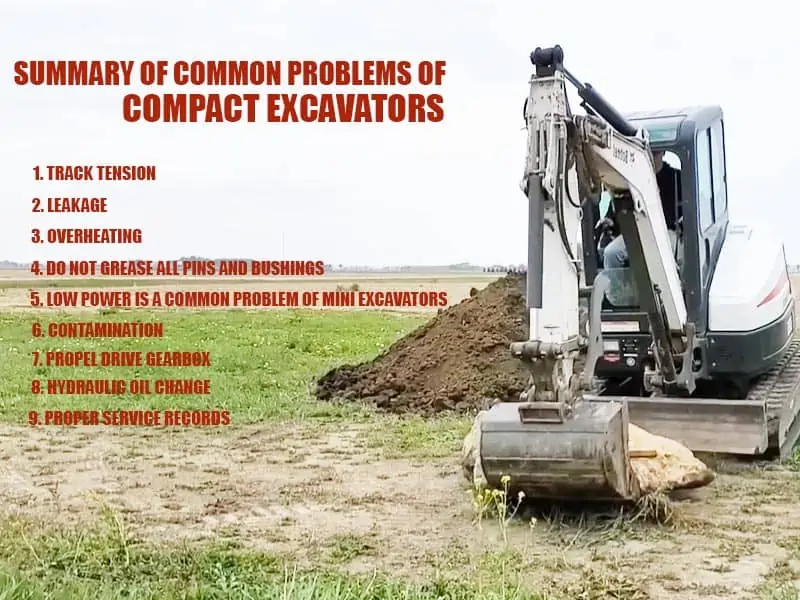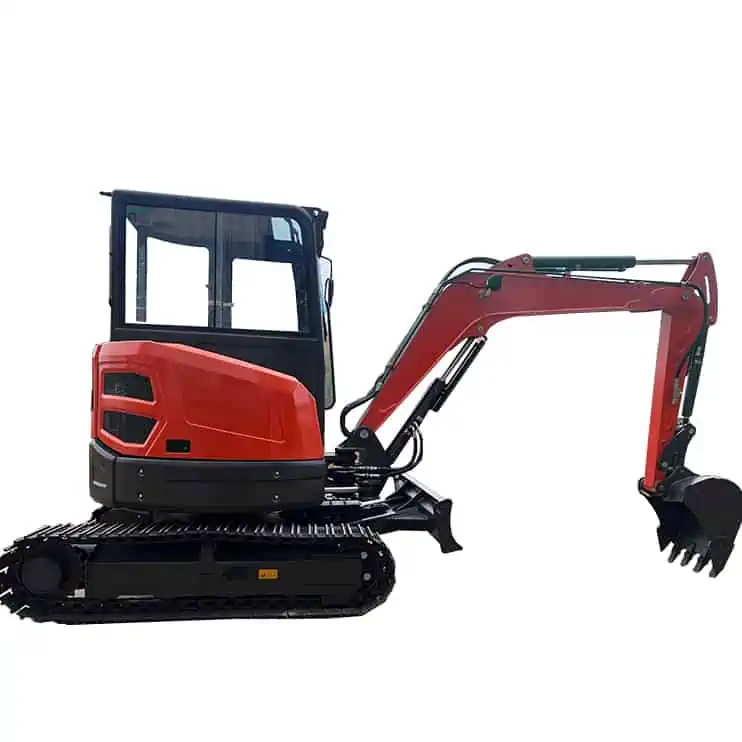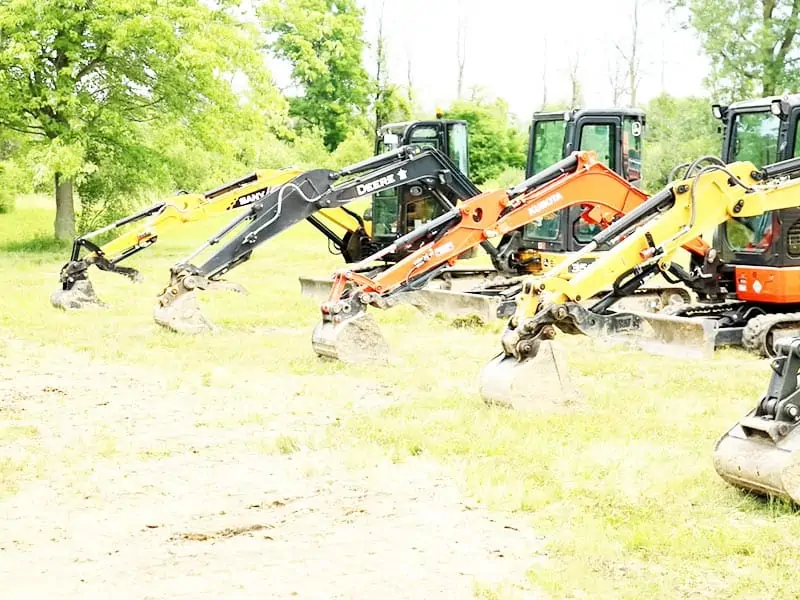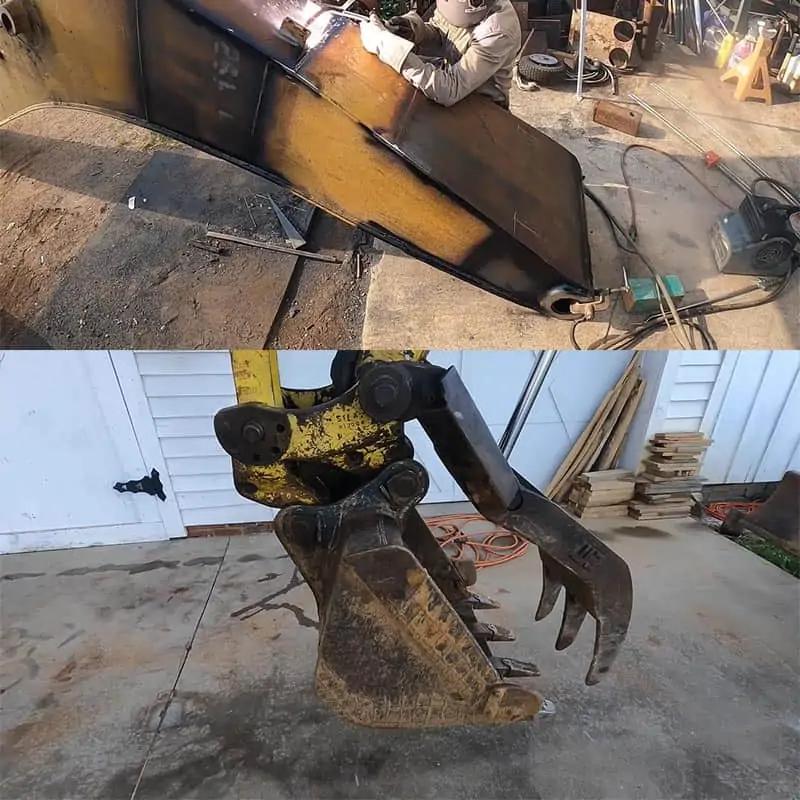Compact excavators need the same amount of maintenance as larger excavators and the same problems as they have. When a construction project is delayed because of the primary cause of heavy equipment breakdowns with machinery like excavators. Here I provide a definite summary of common problems of compact excavators.
So please keep reading and discover the most common problems of compact excavators to avoid them in the future. With the proper care and maintenance, these compact excavators will be produced on-site and can increase your O&O costs. Here are some compact excavator maintenance issues landscapers should pay attention to.
Table of Contents
ToggleSummary of common problems of compact excavators

1. Track tension
It is the first common problem of compact excavators that has to do with track tension. If you want to use your mini excavator for a long time, the excavator tracks must be appropriately adjusted. Because due to the loose track, it can be challenging to maneuver around a construction site, which leads to wear and tear.
So the most ignored service point on compact excavators is track tension. If you do not take care of Maintainance, a loose track will accelerate wear causing unnecessary downtime and putting a stop to the worksite to reinstall a new track. On the other hand, a tight track will cause the rubber material to tear and highly include wear on the other system of track components, including traction motors, sprockets, and front idlers.
Therefore the operators should always follow the operator’s manual and check track sag measurement daily to ensure the track tension is just right. Most have rubber tracks, which need to be appropriately kept adjusted to increase longevity, especially in the winter season. They need special care and minimize wear on the track and its components.

2. Leakage
Another common problem of compact excavators has to do with the oil. As you know, most heavy machinery faces the issue, and there are oil leaks from time to time. The problem of leaking oil can lead to low oil levels that you can not notice, and that causes a compact excavator to fail. Therefore you should check the leakage daily to save from enormous damage.
3. Overheating
When I discuss the common problems of compact excavators, it is also a common problem that your mini excavator heats rapidly. It is also true that almost all equipment heats up with use, but rapid overheating is sure to be a problem. You should check a few things:
Coolant temperature: you have to clear out your coolant and replace it to solve the problem.
Checks for air locks: Particles often get stuck in the radiator core. Use a leaf blower to clear out the core. Removing these particles will solve overheating issues.
Change the thermostat: If your coolant temperature increase and suddenly drops, then the problem is in the thermostat. Check your owner’s manual for advice on replacing a thermostat, or you can take help from a technician for assistance.

4. Do not grease all pins and bushings
Grease is the lifeblood of all pins and bushings and is a regular service point often forgotten about. You should follow the rule of thumb, all pins and bushings should be greased daily. The operator’s manual will help identify each grease point and provide recommendations for the quantity, grade, and quality.
However, suppose multiple operators use your compact excavator; it might be a good idea to mark less obvious grease points, such as the turntable bearing, around the grease nipple as a reminder to all users.
Be careful when greasing pins and bushing because over-greasing can also be problematic. One to three shots of Grease is enough to do the job. Any extra becomes a waste of money while also presenting an environmental hazard, not to mention causing a considerable mess.
5. Low Power is a common problem of mini excavators
These are also common problems of compact excavators because they have low power. You can check a couple of things to troubleshoot low power. You have to perform a few simple checks to examine the air and fuel filters to see if there is any apparent cause for low power.
If you find a problem, solve it immediately or contact any professional. Another cause of low power is an excavator’s cycle time; a certified technician can only test it. They will check how long the machine arm or bucket takes to move from one position to another. If your compact excavator takes longer than usual to perform routine functions, you are dealing with a power problem. So consult the experts to resolve the issue.
6. Contamination
The final drive motor in the compact excavator can also have contamination that comes from the oil. Contamination can happen quickly, with even the tiniest particle getting into the oil. Therefore, you must ensure that your final drive is clean and that nothing in the oil can cause severe damage.
7. Propel drive gearbox is a common problem of compact excavator
The propel drive gearbox is one of the crucial components of a machine’s performance, but operators ignore it during maintenance. The gearboxes are frequently covered in mud, with the fill and drain plugs not visible, so operators and service personnel are rarely aware of them. However, on the other hand, gearboxes need an oil change at around 1,000-hour intervals, depending on the manufacturer.
Even though the gearboxes are small, they are still expensive to manufacture because they have the same internal parts as their larger cousins, just on a smaller scale. Typically holding between a 1/2 to 1 quart of oil, they can be changed pretty quickly in most cases, so it is a small investment that will pay off in the future.
Even though gearboxes are small, they are nevertheless costly to produce since they contain the same internal components as their larger cousins, albeit on a smaller scale. However, they usually store 1/2 to 1 quart of oil and change quickly in most circumstances, so it is a small investment that will pay pays out in the long run.
8. Hydraulic oil change.
Hydraulic systems are designed to precise tolerances, and most hydraulic failures can be traced back to contaminated hydraulic oil or even the wrong hydraulic oil. Hydraulic oil absorbs moisture in the system and keeps it from the hydraulic component;
it can look clean, just like engine oil; it breaks down and loses its viscosity and ability to hold contaminants in suspension, a process that helps protect all moving parts in the system. Rust can be concerning in a sealed hydraulic system constantly filled with oil.
When hydraulic oil turns cloudy, it is a negative point and replaces time. Most machine manufacturers recommend changing hydraulic oil every 2,000 to 4,000 hours, although every unit has its own time for changing. Your operator’s manual will provide a specific servicing detail schedule and oil requirements.
9. Proper Service Records
Proper service records are also beneficial when working with your dealer if any problem arises. Accurate records will prove to your dealer and the manufacturer that you care about your equipment and are servicing the machine as needed. Keeping the record can be the most tedious and time-consuming task.
Still, invoices for oil, filters, and repairs can provide invaluable information in the future when evaluating the service life of your compact excavator. All equipment will ultimately reach the end of its service life.
So keeping records will give you a baseline against which to evaluate the excavator’s performance. In addition, it helps you make an informed decision about whether to buy the same manufacturer’s product or move to a different brand.
Some more common problems of compact excavators are:

Broken Boom: this problem is due to metal fatigue. When your excavator has to fatigue metal, it repeatedly bends and flexes the metal. But it is not a big problem.
Broken Bucket: The most common problem in the compact excavator is the broken attachment of the excavator that is used to scoop up soil and other materials. But it is easy to change it.
Final Verdict
Machines will always have problems, but they can still use them. These problems can only be solved if you find the right solution. The best way to save all of these common problems is to keep up with the maintenance your compact excavator needs, from checking the oil to keeping parts clean and inspecting them regularly.
So you can use these compact excavators, but for significant problems, it is best to consult a professional or take an equipment repair service, and you can also contact us.
